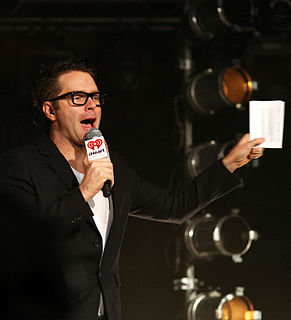A Quote by Cynthia Lennon
I knew the man up until our divorce - after that I didn't know the man, but it didn't stop me caring about him and worrying because of the complete change that I saw in him. He'd lost his sense of humour and he got aggressive; he wasn't for the world any more, he was just for Yoko. Before that he opened his arms and embraced the world with his wit and humour - afterwards he was a completely different kind of person.
Related Quotes
Here's a strange fact: murder a man, and you feel responsible for his life - ''possessive'', even. You know more about him than his father and mother; they knew his fetus, but you know his corpse. Only you can complete the story of his life, only you know why his body has to be pushed into the fire before its time, and why his toes curl up and fight for another hour on earth.
If you saw Atlas, the giant who holds the world on his shoulders, if you saw that he stood, blood running down his chest, his knees buckling, his arms trembling but still trying to hold the world aloft with the last of his strength, and the greater his effort the heavier the world bore down upon his shoulders - What would you tell him?" I…don't know. What…could he do? What would you tell him?" To shrug.
[Speaking of his experience in a concentration camp:] As we said before, any attempt to restore a man's inner strength in the camp had first to succeed in showing him some future goal...Woe to him who saw no more sense in his life, no aim, no purpose, and therefore no point in carrying on. He was soon lost.
I may chance have some odd quirks and remnants of wit broken on me, because I have railed so long against marriage: but doth not the appetite alter? a man loves the meat in his youth that he cannot endure in his age. Shall quips and sentences and these paper bullets of the brain awe a man from the career of his humour? No, the world must be peopled. When I said I would die a bachelor, I did not think I should live till I were married.
A man of knowing attains to a sense of humour. Let this always be remembered. If you see someone who has no sense of humour, know well that that man has not known at all. If you come across a serious man, then you can be certain that he is a pretender. Knowing brings sincerity but all seriousness disappears. Knowing brings a playfulness; knowing brings a sense of humour. The sense of humour is a must.
When I look at Jesus' warm and intimate friendships, my heart fills with praise that Jesus was. . . a man. A man of flesh-and-blood reality. His heart felt the sting of sympathy. His eyes glowed with tenderness. His arms embraced. His lips smiled. His hands touched. Jesus was male! Jesus invites us to relate to him as the Son of Man. And because he is fully man, we can relate to Jesus with affection and love.
A man follows the path laid out for him. He does his duty to God and his King. He does what he must do, not what pleases him. God's truth, boy, what kind of world would this be if every man did what pleased him alone? Who would plough the fields and reap the harvest, if every man had the right to say, 'I don't want to do that.' In this world there is a place for every man, but every man must know his place.
No man is born into the world whose work is not born with him. There is always work, and tools to work with, for those who will, and blessed are the horny hands of toil. The busy world shoves angrily aside the man who stands with arms akimbo until occasion tells him what to do; and he who waits to have his task marked out shall die and leave his errand unfulfilled.
Prosperity knits a man to the world. He feels that he is finding his place in it while really it is finding its place in him. His increasing reputation, his widening circle of acquaintances, his sense of importance, the growing pressure of absorbing and agreeable work build up in him a sense of being really at home on earth which is just what we want.































